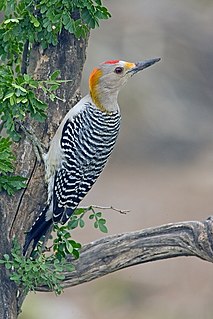
The golden-fronted woodpecker is a North American woodpecker. Its preferred habitat is mesquite, riparian woodlands, and tropical rainforest. It is distributed from Texas and Oklahoma in the United States through Mexico, Belize, Guatemala, El Salvador, Honduras and northern Nicaragua. Cooke listed this species as an abundant resident of the lower Rio Grande Valley, Texas, in 1884.
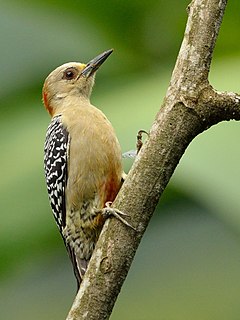
The red-crowned woodpecker is a resident breeding bird from southwestern Costa Rica, Panama, Colombia, Venezuela, the Guianas and Tobago.
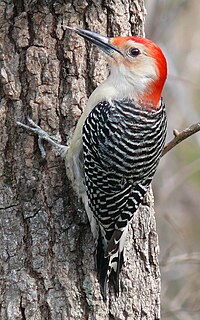
Melanerpes is a genus of woodpeckers of the family Picidae found in the New World. The 24 members of the genus are mostly colourful birds, conspicuously barred in black and white, with some red and yellow.

The white woodpecker is a South American species of woodpecker native to the wooded grasslands of Suriname, French Guiana, Brazil, Bolivia, Paraguay, Uruguay and Argentina. It is a bright white bird with black wings and a distinctive small bright yellow eye patch. The IUCN has rated it as a "least-concern species".

The black-cheeked woodpecker is a resident breeding bird from southeastern Mexico south to western Ecuador.
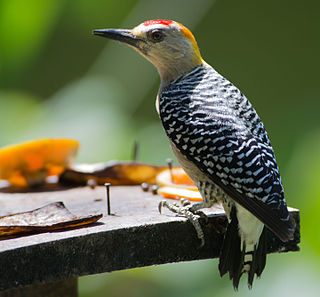
Hoffmann's woodpecker is a resident breeding bird from southern Honduras south to Costa Rica. It is a common species on the Pacific slopes, locally as high as 2,150 m (7,050 ft). It is expanding on the Caribbean slope, aided by deforestation. This is further facilitated by its tendency to wander about outside the breeding season.
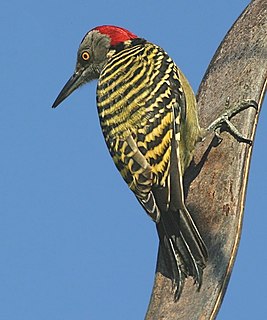
The Hispaniolan woodpecker is a medium-sized woodpecker endemic to the Caribbean island of Hispaniola.

The little green woodpecker, or golden-backed woodpecker, is a species of bird in the family Picidae. It is found in Africa, living in forest edges, clearings, and forest-shrub mosaics. The International Union for Conservation of Nature (IUCN) has assessed it as a least-concern species.

The stripe-breasted woodpecker is a species of bird in the woodpecker family, Picidae. It is found in Southeast Asia within subtropical or tropical moist lowland forest and subtropical or tropical moist montane forest.

The white-fronted woodpecker is a species of bird in the family Picidae. It is found mainly in Bolivia, Paraguay and Argentina. Its natural habitats are subtropical or tropical dry forests, subtropical or tropical dry shrubland, and subtropical or tropical high-altitude shrubland.
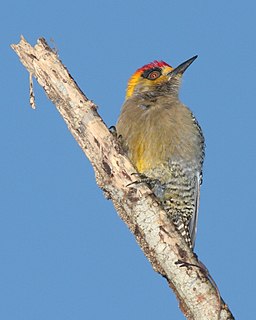
The golden-cheeked woodpecker is a species of bird in the family Picidae. It is endemic to Mexico, in the western, and southwestern coastal strip on the Pacific Ocean, and the western bordering regions of mountains of the Trans-Mexican Volcanic Belt. They are distributed in the coast from Sinaloa to Colima.
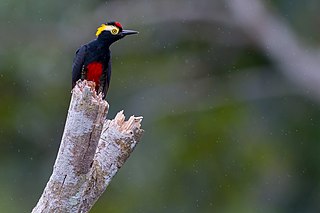
The yellow-tufted woodpecker is a species of woodpecker. It is found in Bolivia, Brazil, Colombia, Ecuador, French Guiana, Guyana, Peru, Suriname, and Venezuela. Its natural habitats are subtropical or tropical moist lowland forests and heavily degraded former forest.
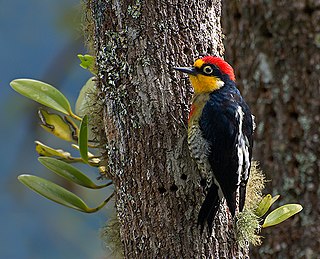
The yellow-fronted woodpecker is a species of bird in the family Picidae. It is found in Brazil, Paraguay and far northeastern Argentina. Its natural habitats are subtropical or tropical moist lowland forests and heavily degraded former forest. It is a fairly common bird with a wide range and the International Union for Conservation of Nature has classified its conservation status as "least concern".

The beautiful woodpecker is a bird species in the woodpecker family (Picidae). It is endemic to Colombia.

The Yucatan woodpecker is a species of bird in the family Picidae. It is sometimes referred to as the red-vented woodpecker. The Yucatan woodpecker is found in Belize and Mexico, and ranges over the entire Yucatán Peninsula. Its natural habitats are subtropical or tropical dry forests, subtropical or tropical dry shrubland, and heavily degraded former forest.
Elliot's woodpecker is a species of bird in the family Picidae. It has an extremely wide range and is described as an uncommon species. However, no particular threats to this species have been established, and the International Union for Conservation of Nature has rated its conservation status as being of "least concern".

The scaled piculet is a species of bird in the woodpecker family Picidae. It is found in Colombia and Venezuela. Its natural habitats are subtropical or tropical dry forests, subtropical or tropical moist lowland forests, and heavily degraded former forest. This bird was first described by the French naturalist Frédéric de Lafresnaye in 1854; five subspecies are recognised.

The bearded woodpecker is a species of bird in the family Picidae. It has a distinctive black and white head and brownish barred body. It is native to tropical central Africa. It has an extremely wide range and is a fairly common species, and the International Union for Conservation of Nature has rated its conservation status as being of "least concern". Some taxonomic authorities place this species in Dendropicos.

The yellow-crested woodpecker, also known as the golden-crowned woodpecker, is a species of bird in the family Picidae. Some taxonomic authorities place this species in Dendropicos. Its typical habitat is wet tropical forest and it is found in Angola, Cameroon, Central African Republic, Republic of the Congo, Democratic Republic of the Congo, Gabon, Kenya, Nigeria, South Sudan, Tanzania and Uganda.

The Cuban green woodpecker is a species of woodpecker in the family Picidae and tribe Melanerpini, known locally in Cuban Spanish as carpintero verde. It is the only species within the genus Xiphidiopicus and is one of two woodpeckers endemic to Cuba. It is the most widespread and common woodpecker in Cuba, inhabiting primarily woodlands, as well as dry and wet forests, pine forests and mangroves. The population of the Cuban green woodpecker is stable and its status is listed as "Least Concern".





















